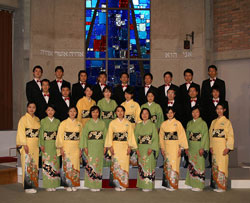Wednesday, June 7, 2006
Daniel Pipes writes on the Muslim co-optation of the Zionist spirit in his piece, Muslim Zionism, and declares it stronger than the current zeal of true Zionists -- at least as far as Jerusalem is concerned. Pipes means the term ironically, of course, but there are some actual Muslim Zionists, like Sheik Palazzi (here, here, here), and there are Zionists in other places, as well.
I happen to be reading The Fugu Plan: The Untold Story Of The Japanese And The Jews During World War II at the moment (I bought the more expensive paperback version -- who knew the book had gone back into print since I added it to my wish list?). It's a terrificaly interesting book about a plan by some folks high in the Japanese hierarchy leading up to World War 2 who, had been exposed to The Protocols of the Elders of Zion but, not being infected with the European-form of anti-Semitism, took the lessons of the book quite differently.

Some enterprising Japanese decided that it would be wise to use this powerful and mysterious people -- their connections with America, their business connections, their enterprise -- rather than simply persecute and destroy them. Thus the term "Fugu" -- named for the blowfish who's meat, a delicacy, must be prepared carefully lest it kill the diner. The Jews were, so these Japanese thought, a potentially powerful, but also dangerous ally. And so they settled and protected them -- in Manchuria, Shanghai, and in Japan itself.
Another interesting note: When some of the Jewish refugees arrive in Kobe, on the Japanese mainland, they encountered a Japanese Christian group known as the Holiness Church who believed the Japanese were decendants of the 10 lost tribes of Israel, pray three times a day for the survival of the Jews and their return to Palestine: (p. 134)
This was 1940.
I'm not sure if it's the same group of Japanese Christians or not (I believe they are different from what I have been able to find), but the travelling choir (pictured above) of such a group just came through Boston recently. I wasn't able to make it, unfortunately, but here's some background on the group: Japanese Hebrew chorus sees Jews as chosen people
...Beit Shalom's adherents neither want to convert Jews to Christianity nor convert to Judaism themselves, Weiss explained. Their goal is world peace, which they believe will come through the state of Israel and world Jewry...
...many Beit Shalom followers displayed a Mogen David outside their homes, Judaica inside and photos of famous Israelis on the walls. In areas where Israeli guests are housed, all signs are in Hebrew. Some of the priests speak fluent Hebrew.
The religion's founder, Takeji Otsuki, had a revelation from God in 1938 when he was told to pray for peace in Jerusalem and for the Jewish people. Otsuki was also told that within 10 years there would be a Jewish state. Thus, Beit Shalom was born.
Although it got off to a slow start, today Beit Shalom has more than 100 churches and 10,000 followers in Japan. Otsuki, 91, who sermonized in the videotape, is passionate about his mission.
Followers of Beit Shalom do not observe Jewish holidays or practice Jewish rituals, according to Weiss. Their interest is Israeli culture.
Participants study modern Hebrew and many go to live in Israel for a time. They have planted a forest in Sha'ar Hagaion, along the road between Jerusalem and Tel Aviv.
Two years ago, Beit Shalom built a Holocaust education center in Fukiyama, a city near Hiroshima. Outside the center, roses called "Anne's roses" bloom. Named for Anne Frank, these are the same strain that grew outside the house in which the Frank family hid in Amsterdam. These roses were sent to Otsuki by Otto Frank...
Some more tidbits of information can be found here: The Jews Of Japan



The timing of the post is interesting, as there is a group of sumo wrestlers from Japan who are visiting Israel this week.
Sounds like an interesting book to me.
A few years back I did a what-if in which Karaite Jews reached Japan and engaged in missionary work there. The end result was the Japanese colonization of the Philipines, discovery and settlement of North America, and the alteration of Japanese Karaitism as a polytheistic faith. (They took the admonition to have no other gods before The Lord seriously, and literally.)
When I left the timeline the old style Shintoists had deposed the Karaite Emperor and established a fundamentalist Shinto shogunate. The Japanese kingdoms in America and their native allies had sworn a vow to liberate the Holy Land and drive the evil Shintoists out. Once a year, at the harvest festival, the Japanese in America swear a solemn vow, "Next year in Kyoto."